How Jiang Zemin quietly changed the nature of Chinas government
January 1, 2023
Chinese Leader Jiang Zemin, who just died at the age of 96, made changes that altered the nature of the countrys government and the course of the global economy, affecting people worldwide, although few people realise it.
Most reports provide key dates in his life but dont explain his biggest contribution: a policy change that freed Chinas ruling political body from its narrow focus, letting it evolve into a more representative government that arguably oversaw more humanitarian and economic development at greater speed than any other in history.
Key policy change
Jiangs 2002 breakthrough was hard for many to understand, being packaged under a rather impenetrable title: The Three Represents. It sounds puzzling but this policy made a key change in how China was governed, and so is worth remembering. Below, we will explain it simply.
But first, some crucial numbers: the Chinese people have always represented a huge proportion of humanity. At the moment, its roughly one five human beings. When Jiang Zemin was on the rise, it was a quarter of the human world, and if we go back to the mid-1800s it was an astonishing one third of the worlds population.
What that means is that today and throughout history, whatever the Chinese achieve for themselves directly affects a huge chunk of the human race and indirectly affects the whole. Heres the story.
The Shanghai spirit
In the past century, Shanghai produced a string of highly capable people, including folk who would become key achievers in mainland China and Hong Kong.
One of these was an electrical engineer in a car factory who rose to become mayor of Shanghai in 1985 and eventually leader of the country in 1989.
That engineer, Jiang Zemin, in 2002 did some important social engineering, making changes that moved the Chinese leadership away from its roots, and changing the way the nation was run.
Until then, the party paid homage to its roots as representatives of the working class. They were the representatives, literally, of the peasant classes. Earlier, Deng Xiaoping had already quietly taken practical steps to change China into a mixed market economy, adopting the best bits of capitalism and socialism. Now it was time to move further by officially recognising who and what Chinas leaders needed to represent, Jiang argued. Their job was far, far more than to represent the workers or the peasants. From now on, they needed to represent three things.
One was to represent that unique energy that drives Chinese people to achieve things, the urge to develop, that productive force.
Another was to represent Chinese culture not in a historical sense, but the modern Chinese culture, which encapsulated the past but was well on its way to becoming advanced.
And third was to represent the Chinese people not just the working peasant classes, but the overwhelming majority, including the workers, the increasingly entrepreneurial middle classes, and even the capitalists.
This policy change was resisted by the Marxists, but Jiang pressed ahead, and found support for it. As a result, the development that Deng Xiaoping had begun really blossomed, giving the government much more flexibility. The change ultimately paved the way for the China we see today: the China which made plenty of mistakes, but ultimately became the worlds biggest trading partner and engine of development; the China which rescued more women, men and children from poverty than all other countries and United Nations agencies put together; and the China which has quietly become the global heartland of scientific research and development, engineering and infrastructure.
China’s rising influence
Today, China is quietly becoming influential. Social media firms everywhere are trying to be more like Chinas Douyin (known as TikTok outside the country). Drone manufacturers worldwide are copying Chinas DJI. Educators across the world are encouraging students to stop dreaming about being influencers or pop singers and at least consider STEM topics, like the geeky kids in China.
Deng Xiaoping may have joined China to the world economy, but former car engineer Jiang Zemin re-engineered the system to prepare it for the future.
And, looking at global economic growth over the past 40 years, its fair to say that many people across the world are benefiting from Chinas peaceful rise.
Its also worth mentioning that it was during Jiang Zemins term that positive relationships with Russia and the United States blossomed, and China began to show its impressive skill at large-scale infrastructure projects, with the building of the Qinghai-Tibet Railway and the Three Gorges Dam. He also steered China into joining the World Trade Organisation, and to win the bid to host the 2008 Summer Olympics.
He leaves a wife, Wang Yeping, and two sons, Jiang Mianheng and Jiang Miankang.
Jiang Zemin will be remembered for many things and for broadening the range of who the Chinese government represented, perhaps most of all.
First published in Fridayeveryday on December 2, 2022

